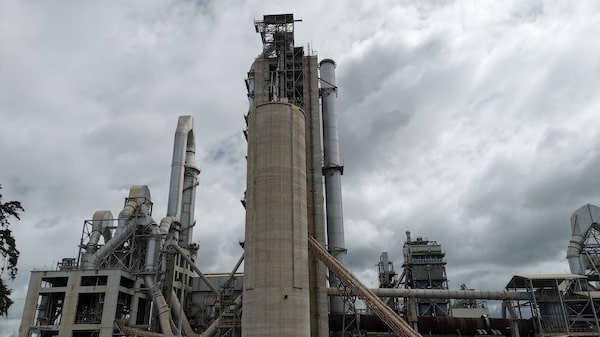Guatemala City — Good fiscal management, macroeconomic stability, the country’s geographical position, and a stable and solid financial sector are aspects that Guatemala should take advantage of to generate more confidence in its public institutions and eliminate bottlenecks that are causing social setbacks, according to Mauricio Claver-Carone, president of the Inter-American Development Bank (IDB), who spoke during a press conference attended by Bloomberg Línea.
Claver-Carone highlighted the importance of the lender continuing to support the country in digital transformation and social projects.
According to data from the IDB’s website, the active loan portfolio granted to Guatemala amounts to $1.10 billion, while social projects are the ones that have attracted more financing, followed by water and sanitation, science and technology, education, energy, environment and natural disasters, reform and modernization of the state, and health and transportation.
“Guatemala has growth potential, and the IDB is currently supporting it in the management of its response to the Covid-19 pandemic, for which it has granted some $500 million in financing. Also, it is receiving support in the digitization of the government to generate confidence with technological tools that provide transparency,” Claver-Carone said.
The IDB president added that the pandemic hit the most vulnerable citizens hardest, and the region faces rising inflation, higher interest rates worldwide, and a shift in geo-economic and geo-political concerns.
Three Priority Areas
According to the lender’s website, the strategy with Guatemala for the period 2021-2024 aims to contribute to reversing Guatemala’s social deterioration, accentuated by the pandemic, and to underpin economic growth with criteria of inclusion and environmental sustainability.
To support this objective, the IDB proposes three priority areas to be addressed:
- Institutional strengthening
- Improvement in the provision of basic services to the most vulnerable
- Boost to the private sector to foment greater and more inclusive and sustainable growth
Gender and diversity, digital transformation, and climate change and response to natural disasters will be addressed, along with issues relating to institutional capacity, rule of law, and transparency and integrity.
The bank will engage in dialogue with the country’s government to address the areas of migration, regional integration, investment promotion, and tourism.
The strategy is aligned with the priorities of the government of Guatemala to address the impacts of the Covid-19 crisis, as well as with the priorities of the government’s 2020-2024 policy, outlined in the National Development Plan K’atun Nuestra Guatemala 2032, and the Guatemala No Se Detiene plan.
In its preparation, an extensive dialogue was held with the country’s authorities, civil society and the private sector, according to the IDB.
More Funds Planned
During 2021, the IDB placed $23.4 billion in financing throughout the region, a record amount for the institution, exceeding the annual average of $20 billion, Claver-Carone said.
During the IDB’s recent assembly, its governors supported historic reforms to the lender, and a proposed capital increase for IDB Invest, with the financing projection for 2025 likely to reach $25 billion.
Establishing a roadmap for a new 21st century business model will enable the institution to scale up ambitious, trade-friendly climate action, protect biodiversity, increase green financing, and further advance gender equality.
The new business model goes hand-in-hand with the proposal for a capital increase for IDB Invest, the bank’s private sector platform.
This proposal will make IDB Invest more responsive to the region’s needs, significantly increase private sector investment and boost formal job creation, with details to be presented to its board of executive directors in September.
The approval of a new value proposition for the bank will improve its ability to address social issues, strengthen the private sector and fight climate change.

These actions by the lender’s governors will modernize the IDB, IDB Invest and IDB Lab, the bank’s innovation lab, ushering in a new 21st century business model that will help Latin American and Caribbean countries more effectively address challenges such as poverty and inequality, climate change and the need for digitization, according to the IDB’s strategy.
The proposed reforms will also enable the bank to accelerate inclusive and sustainable growth by strengthening synergies between the public and private sectors, ensure equal opportunities for women in areas such as education, business and justice, and do more to help countries of the region reach net-zero emissions targets.
“In 2020 and 2021 we rose to the occasion, but we can achieve even more by building on our strengths. Thanks to the governors’ actions, we can now more effectively help the region by mobilizing public and private resources and doing more in key areas such as climate change and gender equality,” Claver-Carone said.
The next IDB and IDB Invest annual meetings will be held in Panama City.
Pandemic Effects Still Linger
The IDB says that even before the pandemic, Latin America and the Caribbean faced considerable socioeconomic challenges, including some of the lowest growth rates in the world, high levels of labor informality, growing social unrest, and with nearly a third of the population living in poverty, as well as large gaps in infrastructure, digitization and financing for small businesses.
The pandemic pushed millions of people into poverty and caused setbacks in equality, especially for women, which undermined the progress made in the last 10 years. In addition, in 2020 the region suffered the worst economic collapse in 200 years, and initially recorded the highest Covid-19 mortality rates in the world.
In 2021, against all expectations, the region experienced one of the fastest economic recoveries globally. However, this recovery has not been accompanied by commensurate improvements in the labor market or in key socioeconomic indicators, particularly for women, who have lost more jobs than men and are finding it difficult to re-enter the labor market, according to the lender.
The region also continues to suffer the effects of school closures of unprecedented length worldwide (231 days on average), and millions of children have yet to return to school.
Translated from the Spanish by Adam Critchley



